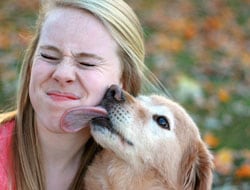How Do People Get Infected with Capnocytophaga?
Many Capnocytophaga germs are normal bacteria commonly found in the mouths of people, dogs, and cats. These germs sometimes cause opportunistic infections, which means under the right conditions they can cause an infection, such as in a person with a weakened immune system.
People with weakened immune systems include those who:
- Drink alcohol excessively
- Have had their spleens removed
- Have HIV infection or cancer

People with these conditions should speak with their doctors about how to safely interact with cats and dogs.
The Capnocytophaga germs that are common in dogs and cats can be spread to people through a bite or after close contact with dogs or cats. Infections are more often linked to dog bites or dog contact.
See the Preventing Dog Bites page for information on how to prevent dog bites and what to do if you are bitten, regardless of your health status.
Other Capnocytophaga germs can also be found in human mouths and can cause illness in some people who have the bacteria in their own mouth. People who have weak immune systems get this type of infection more often than healthy people.
Most reported infections occur in tissues connected to the mouth and throat, including:
- Periodontal (gum) disease
- Respiratory tract infections (infections of the mouth, nose, throat, and lungs)
- Eye infections
In both types of infections—those that spread from animals or from oneself—the bacteria can enter the blood stream, which can lead to infection in various parts of the body. Infection can also cause the following:
- Septicemia (blood infection)
- Endocarditis (inflammation of the lining of the heart)
- Abscesses (collections of pus in the tissue that cause redness and swelling) in various body tissues
- Inflammation of the eyes, face, lymph nodes, or brain membranes
Most contact with dogs and cats does not lead to a Capnocytophaga infection or any illness, even after a bite. But, you should take precautions if you have contact with animals, especially if you have a condition that puts you at higher risk of infection.